Doing business
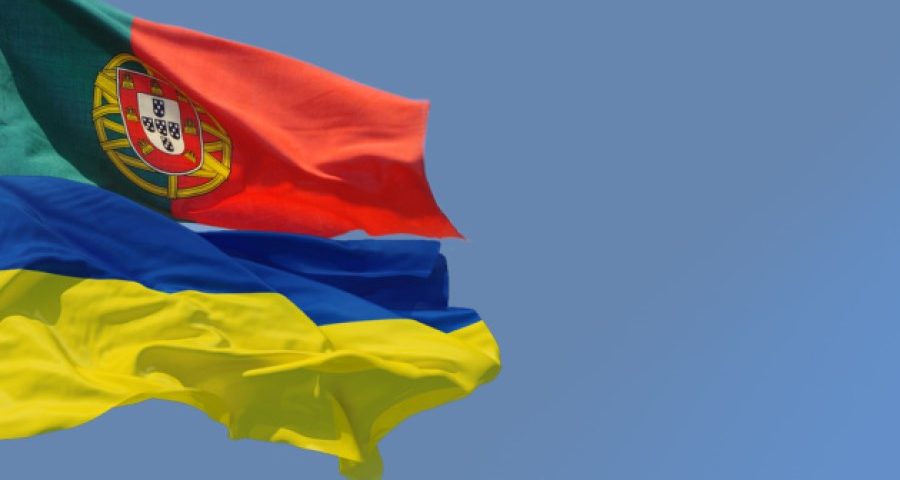
Portugal has been providing Ukraine with comprehensive support since the beginning of the russian invasion in 2022 and maintains its unwavering commitment to Ukraine’s sovereignty and territorial integrity. Lisbon supports President Zelenskyy’s Peace Formula, bringing the aggressor to justice, strengthening sanctions against russia, and establishing a mechanism for compensation for crimes. The Republic of Portugal supports Ukraine bilaterally and through the European Union and NATO, among others, by providing lethal and non-lethal military equipment, including Leopard 2A6 main battle tanks, UAV systems, M113 armored personnel carriers, M113 and M577 armored rescue and medical evacuation vehicles, and other military equipment.
President of Ukraine Volodymyr Zelenskyy signed a bilateral Security Cooperation Agreement with Prime Minister of Portugal Luiz Montenegro during a visit to Lisbon on May 28, 2024. The document stipulates that Portugal reaffirms its support for Ukraine’s reforms for its accession to the European Union and NATO, including the strengthening of economic and trade relations “leading to the gradual rapprochement of Ukraine with the European Union’s internal market.” Portugal became the twelfth country with which Ukraine signed a security cooperation agreement designed to provide long-term support.
In addition, the agreement confirms Portugal’s participation in the F-16 Coalition, the International Maritime Security Capabilities Coalition, as well as in the large-caliber ammunition procurement program, mine action and maritime security efforts. Portugal also continues to participate in the International Coalition for the Return of Ukrainian Children and contributes to the goals set out in the Coalition’s Framework Document.
The government has agreed to provide an additional €95 million to the previously approved €126 million in military assistance, which was planned for 2024. At the same time, in 2025, the Republic of Portugal will allocate €220 million in military aid to Ukraine.
Portugal has provided Ukraine with 1000 tons of military aid since the beginning of russia’s full-scale invasion. In addition, the Portuguese government has allocated €100 million for the Czech initiative to purchase artillery shells for the Ukrainian Defense Forces. Thus, Portugal has joined other countries that have already supported the Czech initiative to jointly purchase and rapidly deliver large caliber ammunition to Ukraine.
Portugal also continues its support to strengthen the capacity of the Ukrainian Security and Defense Forces, in particular through the EU Military Assistance Mission (EUMAM) and the EU Advisory Mission (EUAM) in support of Ukraine.
The development of mutually beneficial trade and economic cooperation also remains an important priority for the two countries. The analysis of export and import operations of the Dnipropetrovsk region with Portugal demonstrates a high level of partnership, as this country is an important trading partner of the region.
According to the results of 2023, the volume of exports of goods from Dnipropetrovsk region increased 5.4 times and amounted to $8.8 million. Among the goods in demand among Portuguese consumers are cereals, seeds and fruits of oilseeds, ferrous metal products, edible fruits and nuts, plastics and polymers, etc.
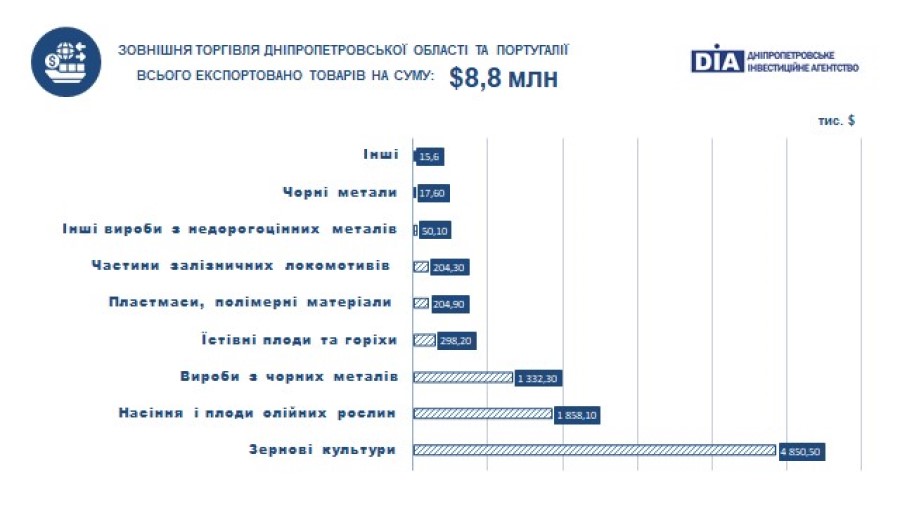
Export operations were carried out by 19 companies from Dnipropetrovsk region. The main exporters are agricultural, metallurgical, machine-building, and processing companies.
TOP-5 exporters (ranked by export volume):
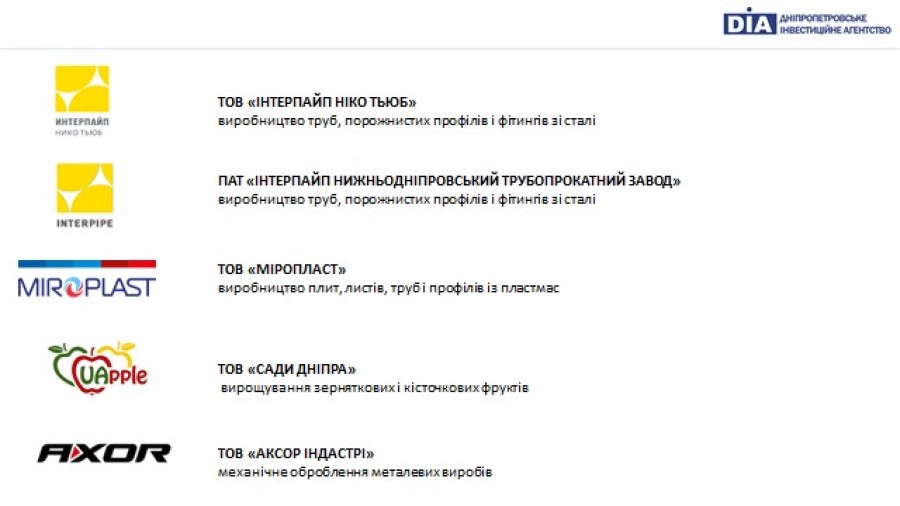
Imports of goods from Portugal to Dnipropetrovsk region amounted to $3.2 million and increased by 15.8% compared to 2022. Traditionally, Dnipropetrovsk region purchased pharmaceuticals, alcoholic and non-alcoholic beverages, electrical machinery, fish and crustaceans, machinery and equipment, processed vegetables, and other goods.
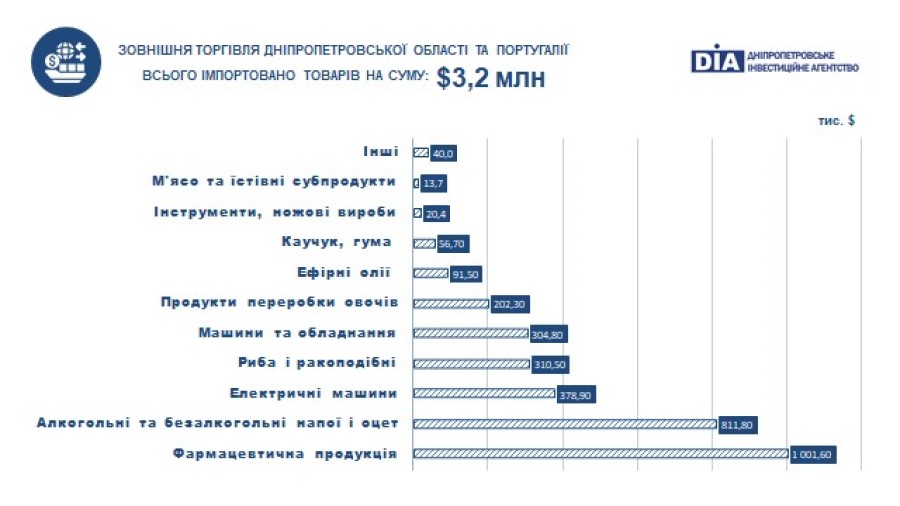
Import operations were carried out by 55 importers.
TOP-5 importers (ranked by volume of imported products):
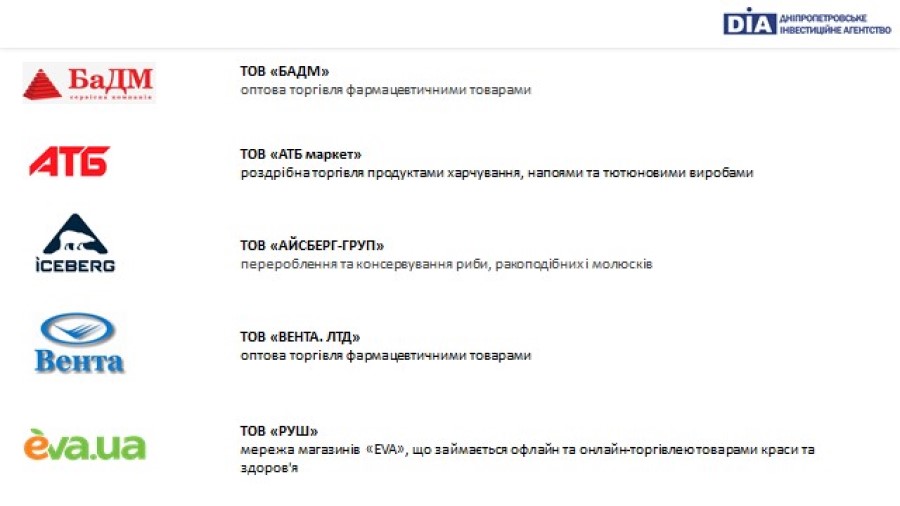
Imports were mainly carried out by pharmaceutical, food, trade, machine-building, and processing companies.
Source: information for the article was taken from open online sources